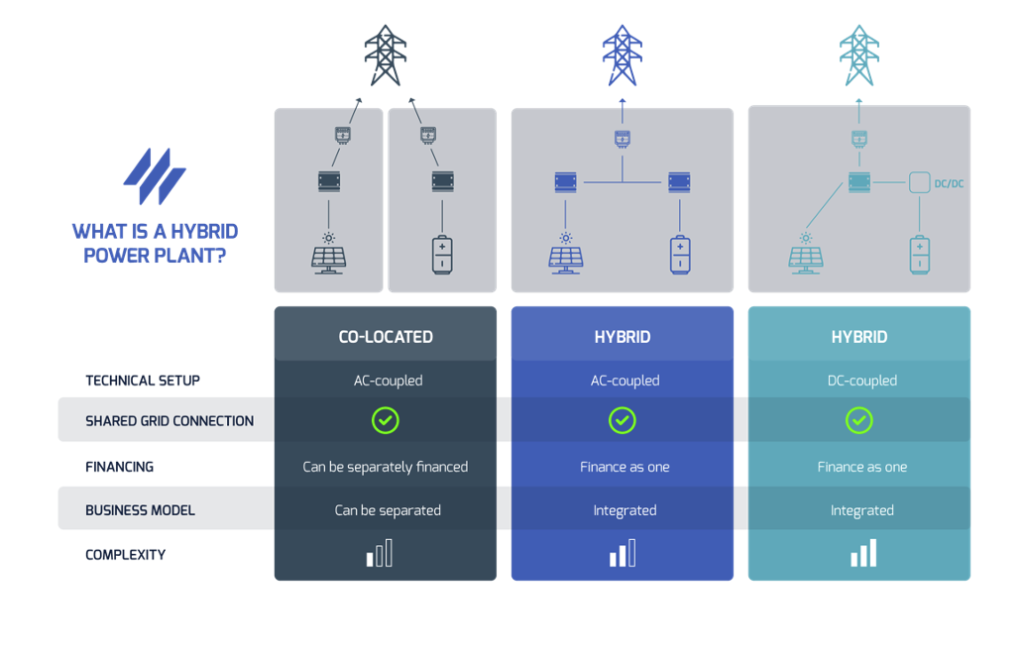Co-Location vs. Hybrid: Is the Future of Power Plants a Battle of Business Models?

After we introduced renewables in our energy landscape now a new era has begun. Why? With higher shares of renewables our energy system needs more flexibility and solutions to balance the intermitted production of solar and wind farms. Battery Energy Storage Systems (BESS) seems to be one of the best suited solutions and therefore everybody in the industry is talking about “co-location” and hybrid power plants”. These terms aren’t used consistently or in the same manner by all market participants or in all regions of the world. In this blog article we share with you how we see this topic and hope to shed some light on it.
Currently, there are different implementation options for combining renewable generation sources like solar and wind with a BESS. Those “hybrid power plants” differ in their technical and economic setup. But what is meant by those terms, what are the differentiation and what is the best approach for your project?
Let’s start with a brief characterization of the two approaches using the example of a PV + BESS project:
Co-location:
- No shared business case
- The plant is economically considered as two separate plants (PV and BESS), each optimized economically on its own in operation.
- They share the same point of interconnection (POI) to the public grid and/or are at the same project location but are economically independent.
(Full) Hybrid
- Shared business case
- the plant is economically considered as one unit and optimized during operation economically as a whole.
- They share the same point of interconnection (POI) to the public grid and/or the same project location and are economically interdependent.
The comparison of both approaches shows that co-location and hybrid have different business logics and therefore also a different optimization goal. This needs to be considered when choosing the technical setup and especially when implementing the operations strategy.
Co-Location
- Focuses on faster grid connection for the battery (time to grid/market), better utilization of the Point of Interconnection (POI), and cost distribution for grid connection infrastructure.
- Charging the Battery Energy Storage System (BESS) with PV/Wind is not the primary goal or is not possible.
- Both plants must be profitable on their own.
(Full) Hybrid
- Aims to improve the internal rate of return (IRR) of the system with storage and better utilization of the POI.
- Charging the Battery Energy Storage System (BESS) with PV/Wind to use it at later time, to avoid “clipping losses” or to shape a concrete power output profile are the primary use cases. Charging the battery from the grid is (in some cases) not allowed or not wanted.
- Typical examples of hybrid power plants are plants from the German innovation tender or DC-coupled plants.
In summary, the co-location and hybrid approaches offer distinct business models and operational strategies for combining renewables with batteries. Co-location treats the PV and battery systems as separate economic entities, focusing on independent profitability and shared grid infrastructure benefits. Conversely, the hybrid model integrates the renewable generator and battery system into a single economic unit, aiming for holistic optimization and enhanced internal rate of return of the whole asset through combined operations.
Answering the question from our title. Is the Future of Power Plants a Battle of Business Models?
The choice between these models depends on specific project goals, regulatory environments, and market conditions. Co-location can offer flexibility and immediate benefits in grid connection, while hybrids provide deeper integration and potential long-term economic advantages through shared investment and operational synergies.
There is no golden rule or a solution which fits all – no surprise. But when the different characters of both approaches are well understood, one can better figure out if co-location or “full” hybrid fits better to the project, its individual situation and goals.
Are you currently thinking about combining renewables with BESS in your next project and still wonder what would be the right way to do so?
Reach out to us and schedule a call with our experts, so we can discuss your current situation and a potential solution.